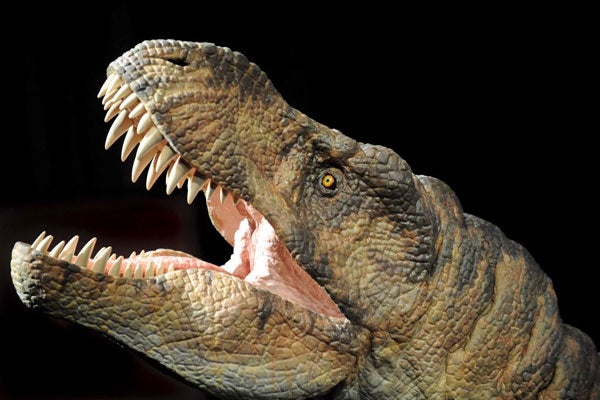Sense of smell helped T. rex hunt at night

Your support helps us to tell the story
This election is still a dead heat, according to most polls. In a fight with such wafer-thin margins, we need reporters on the ground talking to the people Trump and Harris are courting. Your support allows us to keep sending journalists to the story.
The Independent is trusted by 27 million Americans from across the entire political spectrum every month. Unlike many other quality news outlets, we choose not to lock you out of our reporting and analysis with paywalls. But quality journalism must still be paid for.
Help us keep bring these critical stories to light. Your support makes all the difference.
Dinosaur king Tyrannosaurus rex may have actively hunted at night, stalking its prey with a highly sensitive nose, research suggests.
A study found that T. rex had a superior sense of smell to other meat-eating dinosaurs.
The discovery could restore the dinosaur's reputation as a fearsome hunter after claims that it primarily scavenged for food.
Dr Darla Zelenitsky, from the University of Calgary in Canada, who led a team looking at the smell centres or "olfactory bulbs" of dinosaur brains, said: "Large olfactory bulbs are found in living birds and mammals that rely heavily on smell to find meat, in animals that are active at night, and in those animals that patrol large areas.
"Although the king of carnivorous dinosaurs wouldn't have passed on scavenging a free dead meal, it may have used its sense of smell to strike at night or to navigate through large territories to find its next victim."
The scientists scanned and measured the skulls of a wide variety of "theropods" - carnivorous dinosaurs which stood on two legs - as well as the primitive bird Archaeopteryx.
Although the brains of dinosaurs are not preserved, the space they occupied and impressions they made in the skull reveals a lot of information about their structure.
Of all the dinosaurs investigated, T. rex was found to have the largest part of its brain devoted to a sense of smell.
The findings were reported today in the journal Proceedings of the Royal Society B.
Surprisingly, the extinct bird Archaeopteryx had an olfactory bulb as proportionally large as that of most theropod dinosaurs.
Modern birds, in contrast, have good vision but their sense of smell is usually poor.
"Our results tell us that the sense of smell in early birds was not inferior to that of meat-eating dinosaurs," said co-author Francois Therrien, from the Royal Tyrrel Museum, Drumheller, Alberta, Canada.
"The primitive bird Archaeopteryx had a sense of smell comparable to meat-eating dinosaurs, while at the same time it had very good eyesight."
Subscribe to Independent Premium to bookmark this article
Want to bookmark your favourite articles and stories to read or reference later? Start your Independent Premium subscription today.
Join our commenting forum
Join thought-provoking conversations, follow other Independent readers and see their replies
Comments